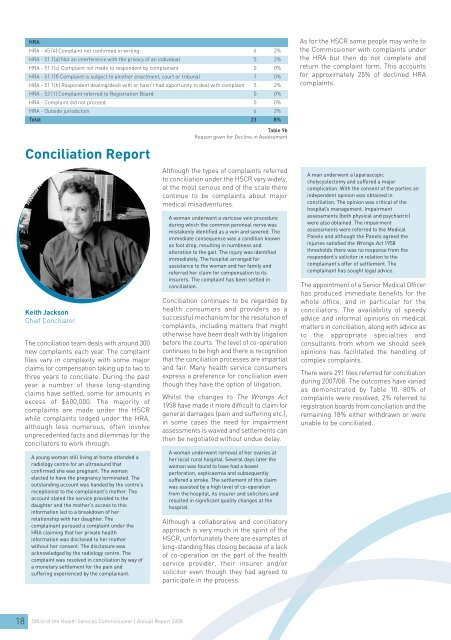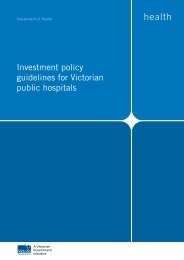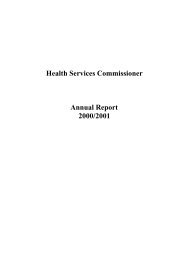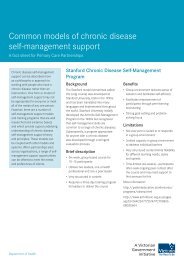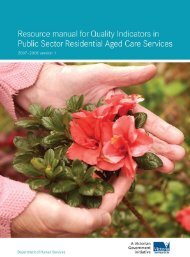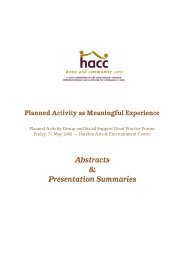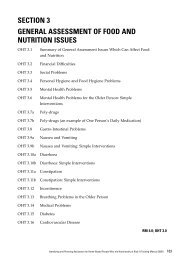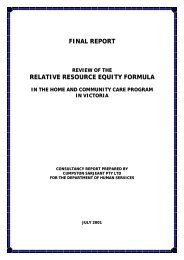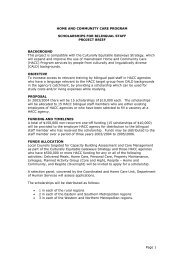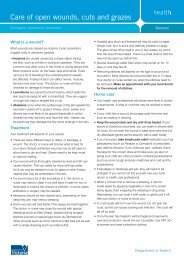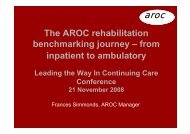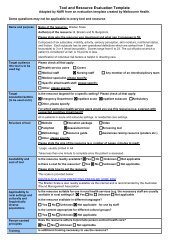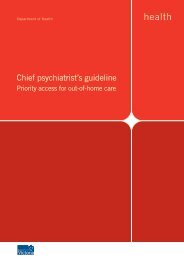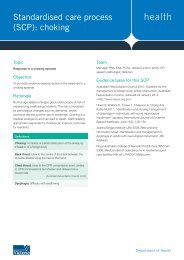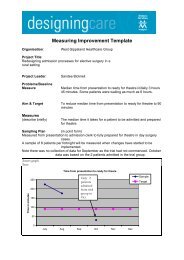Office of the Health Services Commissioner Annual Report 2008
Office of the Health Services Commissioner Annual Report 2008
Office of the Health Services Commissioner Annual Report 2008
Create successful ePaper yourself
Turn your PDF publications into a flip-book with our unique Google optimized e-Paper software.
HRA<br />
HRA - 45 (4) Complaint not confirmed in writing 6 2%<br />
HRA - 51 1(a) Not an interference with <strong>the</strong> privacy <strong>of</strong> an individual 5 2%<br />
HRA - 51 1(c) Complaint not made to respondent by complainant 0 0%<br />
HRA - 51 1(f) Complaint is subject to ano<strong>the</strong>r enactment, court or tribunal 1 0%<br />
HRA - 51 1(h) Respondent dealing/dealt with or hasn’t had opportunity to deal with complaint 5 2%<br />
HRA - 52 (1) Complaint referred to Registration Board 0 0%<br />
HRA - Complaint did not proceed 0 0%<br />
HRA - Outside jurisdiction 6 2%<br />
Total 23 8%<br />
Conciliation <strong>Report</strong><br />
Keith Jackson<br />
Chief Conciliator<br />
The conciliation team deals with around 300<br />
new complaints each year. The complaint<br />
files vary in complexity with some major<br />
claims for compensation taking up to two to<br />
three years to conciliate. During <strong>the</strong> past<br />
year a number <strong>of</strong> <strong>the</strong>se long-standing<br />
claims have settled, some for amounts in<br />
excess <strong>of</strong> $600,000. The majority <strong>of</strong><br />
complaints are made under <strong>the</strong> HSCR<br />
while complaints lodged under <strong>the</strong> HRA,<br />
although less numerous, <strong>of</strong>ten involve<br />
unprecedented facts and dilemmas for <strong>the</strong><br />
conciliators to work through.<br />
A young woman still living at home attended a<br />
radiology centre for an ultrasound that<br />
confirmed she was pregnant. The woman<br />
elected to have <strong>the</strong> pregnancy terminated. The<br />
outstanding account was handed by <strong>the</strong> centre’s<br />
receptionist to <strong>the</strong> complainant’s mo<strong>the</strong>r. The<br />
account stated <strong>the</strong> service provided to <strong>the</strong><br />
daughter and <strong>the</strong> mo<strong>the</strong>r’s access to this<br />
information led to a breakdown <strong>of</strong> her<br />
relationship with her daughter. The<br />
complainant pursued a complaint under <strong>the</strong><br />
HRA claiming that her private health<br />
information was disclosed to her mo<strong>the</strong>r<br />
without her consent. The disclosure was<br />
acknowledged by <strong>the</strong> radiology centre. The<br />
complaint was resolved in conciliation by way <strong>of</strong><br />
a monetary settlement for <strong>the</strong> pain and<br />
suffering experienced by <strong>the</strong> complainant.<br />
Table 9b<br />
Reason given for Decline in Assessment<br />
Although <strong>the</strong> types <strong>of</strong> complaints referred<br />
to conciliation under <strong>the</strong> HSCR vary widely,<br />
at <strong>the</strong> most serious end <strong>of</strong> <strong>the</strong> scale <strong>the</strong>re<br />
continue to be complaints about major<br />
medical misadventures.<br />
A woman underwent a varicose vein procedure<br />
during which <strong>the</strong> common peroneal nerve was<br />
mistakenly identified as a vein and severed. The<br />
immediate consequence was a condition known<br />
as foot drop, resulting in numbness and<br />
alteration to <strong>the</strong> gait. The injury was identified<br />
immediately. The hospital arranged for<br />
assistance to <strong>the</strong> woman and her family and<br />
referred her claim for compensation to its<br />
insurers. The complaint has been settled in<br />
conciliation.<br />
Conciliation continues to be regarded by<br />
health consumers and providers as a<br />
successful mechanism for <strong>the</strong> resolution <strong>of</strong><br />
complaints, including matters that might<br />
o<strong>the</strong>rwise have been dealt with by litigation<br />
before <strong>the</strong> courts. The level <strong>of</strong> co-operation<br />
continues to be high and <strong>the</strong>re is recognition<br />
that <strong>the</strong> conciliation processes are impartial<br />
and fair. Many health service consumers<br />
express a preference for conciliation even<br />
though <strong>the</strong>y have <strong>the</strong> option <strong>of</strong> litigation.<br />
Whilst <strong>the</strong> changes to The Wrongs Act<br />
1958 have made it more difficult to claim for<br />
general damages (pain and suffering etc.),<br />
in some cases <strong>the</strong> need for impairment<br />
assessments is waived and settlements can<br />
<strong>the</strong>n be negotiated without undue delay.<br />
A woman underwent removal <strong>of</strong> her ovaries at<br />
her local rural hospital. Several days later <strong>the</strong><br />
woman was found to have had a bowel<br />
perforation, septicaemia and subsequently<br />
suffered a stroke. The settlement <strong>of</strong> this claim<br />
was assisted by a high level <strong>of</strong> co-operation<br />
from <strong>the</strong> hospital, its insurer and solicitors and<br />
resulted in significant quality changes at <strong>the</strong><br />
hospital.<br />
Although a collaborative and conciliatory<br />
approach is very much in <strong>the</strong> spirit <strong>of</strong> <strong>the</strong><br />
HSCR, unfortunately <strong>the</strong>re are examples <strong>of</strong><br />
long-standing files closing because <strong>of</strong> a lack<br />
<strong>of</strong> co-operation on <strong>the</strong> part <strong>of</strong> <strong>the</strong> health<br />
service provider, <strong>the</strong>ir insurer and/or<br />
solicitor even though <strong>the</strong>y had agreed to<br />
participate in <strong>the</strong> process.<br />
As for <strong>the</strong> HSCR some people may write to<br />
<strong>the</strong> <strong>Commissioner</strong> with complaints under<br />
<strong>the</strong> HRA but <strong>the</strong>n do not complete and<br />
return <strong>the</strong> complaint form. This accounts<br />
for approximately 25% <strong>of</strong> declined HRA<br />
complaints.<br />
A man underwent a laparascopic<br />
cholycystectomy and suffered a major<br />
complication. With <strong>the</strong> consent <strong>of</strong> <strong>the</strong> parties an<br />
independent opinion was obtained in<br />
conciliation. The opinion was critical <strong>of</strong> <strong>the</strong><br />
hospital’s management. Impairment<br />
assessments (both physical and psychiatric)<br />
were also obtained. The impairment<br />
assessments were referred to <strong>the</strong> Medical<br />
Panels and although <strong>the</strong> Panels agreed <strong>the</strong><br />
injuries satisfied <strong>the</strong> Wrongs Act 1958<br />
thresholds <strong>the</strong>re was no response from <strong>the</strong><br />
respondent’s solicitor in relation to <strong>the</strong><br />
complainant’s <strong>of</strong>fer <strong>of</strong> settlement. The<br />
complainant has sought legal advice.<br />
The appointment <strong>of</strong> a Senior Medical <strong>Office</strong>r<br />
has produced immediate benefits for <strong>the</strong><br />
whole <strong>of</strong>fice, and in particular for <strong>the</strong><br />
conciliators. The availability <strong>of</strong> speedy<br />
advice and informal opinions on medical<br />
matters in conciliation, along with advice as<br />
to <strong>the</strong> appropriate specialties and<br />
consultants from whom we should seek<br />
opinions has facilitated <strong>the</strong> handling <strong>of</strong><br />
complex complaints.<br />
There were 291 files referred for conciliation<br />
during 2007/08. The outcomes have varied<br />
as demonstrated by Table 10. 80% <strong>of</strong><br />
complaints were resolved, 2% referred to<br />
registration boards from conciliation and <strong>the</strong><br />
remaining 18% ei<strong>the</strong>r withdrawn or were<br />
unable to be conciliated.<br />
18<br />
<strong>Office</strong> <strong>of</strong> <strong>the</strong> <strong>Health</strong> <strong>Services</strong> <strong>Commissioner</strong> | <strong>Annual</strong> <strong>Report</strong> <strong>2008</strong>


